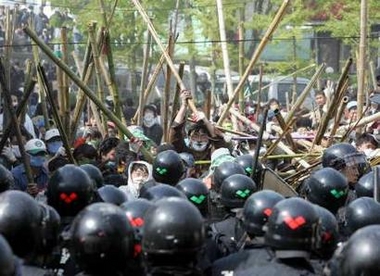KCTU Thugs May Have to Switch to PVC Pipe
When I testified before the House International Relations Committee last September, one of the issues I raised was a report that the South Korean government was funding “civic groups” that habitually engaged in violence (see page 18), including the protests at Camp Humphreys last year. More recently, some of the leaders of those protests, and other violent anti-American protests, have been exposed and indicted as North Korean agents. This should not have surprised anyone. The head of the group providing most of the muscle at Humphreys, the Korean Confederation of Trade Unions, was openly spouting North Korean propaganda.
“During the May 1 North-South Workers’ Rally in Pyongyang, the workers of North and South agreed to unify to carry out the anti-American struggle”¦ The center of that struggle with the United States is Daechu-ri, Pyeongtaek.Â
The KCTU also has a long pedigree for directing violence and intimidation against those with whom it disagrees, and yes, it was among those receiving government funds.

The two questions I raised were (1) is the ROK government subsidizing groups that attack American service members on the streets of Seoul (start at page 16), and (2) should the ROK government subsidize violent groups at all? (The greater question is why America should let itself be the target of these groups when the South Korean government won’t defend America’s presence, or the basic dignity or physical safety of its personnel). The National Assembly now appears to see at least my first point.
Lawmakers want the government to cut subsidies for organizations with a record of illegal protests when it allocates this year’s budget of W10 billion (US$1=W931) for civic and social groups. “Conscripted police were injured and expensive police equipment was damaged in violent illegal protests and they also caused inconvenience and difficulties to people,” a member of the National Assembly’s Budget Settlement Committee said. “The idea is that it makes no sense for the government to subsidize organizations despite all the trouble they cause. The measure was first proposed by the GNP but has the support of the ruling Uri Party.
The National Assembly’s action follows a similar move by the city government of Kwangju a month ago. Today, Kwangju has gone a step further and put liens on the property of six violent protestors:
In November, the city asked for compensation of 200 million won ($214,000) for broken windows and fire damage to city buildings during a rally to protest free trade negotiations between Korea and the United States.
The court ordered property belonging to the six people and worth 200 million won seized until the city’s lawsuit is adjudicated.
And now, a great moment in chutzpah:
The Korean Confederation of Trade Unions office here was outraged. “The court is on the side of those with money and power, and put down the demands of laborers and farmers for the suspension of the negotiations,” said a statement by the group. “The ruling will add momentum to our protests to stop the negotiations.”
The union group said it would rally today with the Korean Peasants League to demand that the city drop the lawsuit.
Kwangju isn’t alone, either.
The North and South Chung-cheong provincial governments, the Gangwon provincial government and the police division in South Chungcheong province have also filed suits against anti-trade protesters, asking for compensation of more than 300 million won in total.
And South Chungcheong is thinking it over. This looks like is a major step in the direction of my steady drumbeat about reasserting the rule of law. Bravo.
The limitation on subsidizies still doesn’t go far enough. Whenever a goverment subsidizes any partisan or political organization, it comparatively disadvantages any group that it chooses not to subsidize (I take the same view of public financing of parties and campaigns here in the United States, and I don’t think you can legally exclude Wiccans or Scientology from faith-based initiatives, either, for that matter). Public funding also gives the government the implicit power to control the message of an organization it funds, in addition to its methods.
This is just a bad idea. The entire program should be scrapped. The government best serves free speech by creating an environment in which it’s protected from interference by the intolerant. Otherwise, the popular discourse prospers best without government meddling.
3 Responses